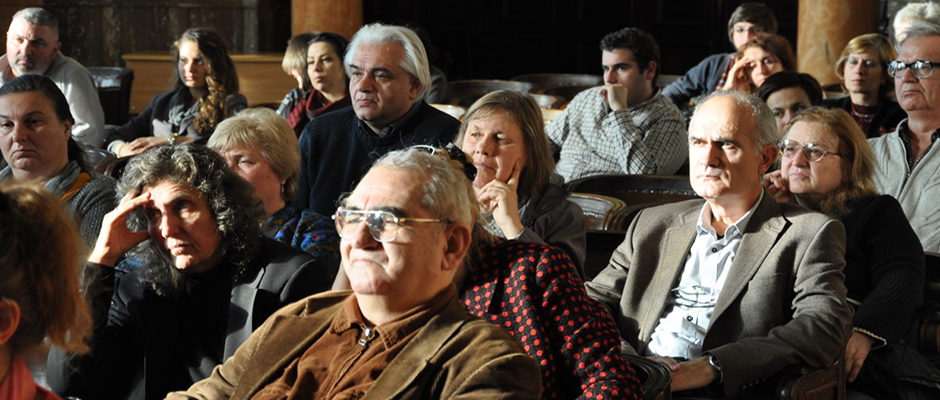Mission

Mission and Tasks of BFO-Fenomenologia*
As a community of the Bulgarian Philosophical Society (BPS), BFO-Fenomenologia has the same goals as the BPS, it is to promote the professional exchange between Bulgarian philosophers, to organize conferences, to publish collective papers, books etc. However, it has also specific tasks. One of them is to take stock of the existing publications of Bulgarian philosophers in the field of Phenomenology. For Philosophy is not just the result of some “great philosophers” (Jaspers), but also tradition and discourse. Even Bulgaria, at the difference of other post-communist countries, cannot boast with such leading phenomenology scholars like Ingarden, Gurwitsch, Lossky, Frank, Shpet, Lukács, Patočka, Koyré etc., Bulgarian research in phenomenology do not begin in 2015. Even before 1990 there were studies and translations of short texts, yet in-depth research, translations of the key texts of phenomenology, as well as phenomenology courses and seminars became possible only after the Fall of the Berlin wall. Let me remember that my book From Husserl to Ricoeur (Raynova 1993) is the result of a course on the same subject that was held in 1990 at Sofia University; it was published later, in 1993, as monograph at the suggestion of Prof. Isaak Passy.
In the past 25 years, many colleagues held courses and lectures in phenomenology, but I want here specially to mention the Bachelor, Master and Doctoral Programs in Philosophical Anthropology, installed and directed by Assoc. Prof. Ivan Kolev at Sofia University since 2014. These Programs are not just impressive, even emblematic, but opens also the doors for advanced studies in phenomenology.
Let me also remember that, based on a project on “Phenomenology and Post-Phenomenology,” in 1995 was founded the Bulgarian Phenomenological Center as a research collective of the former Institute for Philosophical Research at the Bulgarian Academy of Sciences. It gathered many scholars together, not only from Bulgaria but also from other countries. In its invited lecture program participated Françoise Dastur, William MacBride, Reinhard Hesse, Ludwig Nagl, Stefan Knoche a.o. In 2002 the Center became founding member of the Organization of Phenomenological Organizations (OPO). In 2004 it organized a first International Phenomenology Conference in Bulgaria and published diverse collective works.
Special mentioned should be also the Phenomenological Atelier, which was initiated at the Academy of Fine Arts by Prof. Dimitar Zashev, the translator of Heideggers Sein und Zeit into Bulgarian, as well as a series of international conferences, dedicated on the work of Paul Ricoeur, Jacques Derrida, Maurice Merleau-Ponty, and Martin Heidegger.
In a Study, published last year in English (see Raynova 2014, 118-156), I try to give an overview of the monographs, the collective works, and other publications in Bulgaria in the field of phenomenology. Yet, this is not enough. An analysis of the articles, dissertations, translations, courses, and lectures is also of need. Such extensive work should be done by a collective and by means of an interactive directory with database, where authors can supply themselves bibliographic information.
Consequently, one of the main tasks of BFO-Fenomenologia will be to take stock and to uncover past phenomenology activities in Bulgaria, which should serve as a basis for building an own philosophical tradition.
Another task and goal of BFO-Fenomenologia is to unify the efforts of Bulgarian philosophers for the stimulation of the academic exchange trough annual meetings in form of conferences, colloquia, workshops, discussions, book presentations, and debates on the problems of translation. A successful initiation in this respect was the conference “Phenomenologies: The Heritages of Edmund Husserl”, organized by Assoc. Prof. Ivan Kolev and Assoc. Prof. Christo Stoev, at the University of Sofia, November this year, which became the foundation event of BFO-Fenomenologia. Here should be emphasized that this newly established community can prosper only if there is a continuity of the activities and the results are published, i.e. became accessible to interested scholars and students. That is why we envisage organizing several meetings per year, as well to publish proceedings and anthologies.
Last, but not least, it is very important that BFO-Fenomenologia open up to the international academic discourse and to the living sources of the phenomenological tradition. In this respect, additional efforts are required to overcome the language barriers and the lack of financial support. No matter how difficult that is, BFO-Fenomenologia will give its best to organize international phenomenology meetings, to invite leading experts as lecturers, and to promote publications of Bulgarian scholars in English, German and French.
Prof. PhD, DrPhil, ScD, Yvanka B. Raynova
Notes
* This text is based on a speech presented at the first Meeting of the Bulgarian Philosophical Society (19.11.2015). The Bulgarian version was published in BPS-Newsletter Nr. 2, 2015.
References
Yvanka B. Raynova. "Main Trends in the Reception of Phenomenology, Existential Philosophy and Hermeneutics in Bulgaria," in Philosophical Receptions: Transmissions, Affinities and Originality, ed. by Tatiana Batuleva, Sofia: "St. Ivan Rilski" Publishing House 2014, 118-156.
----- Ot Husserl do Rikjor. Fenomenologicheskiat podhod kam choveka (From Husserl to Ricoeur. The Phenomenological Approach to Human Being). Sofia: University Press “St. Kliment Ochridski”, 1993.
